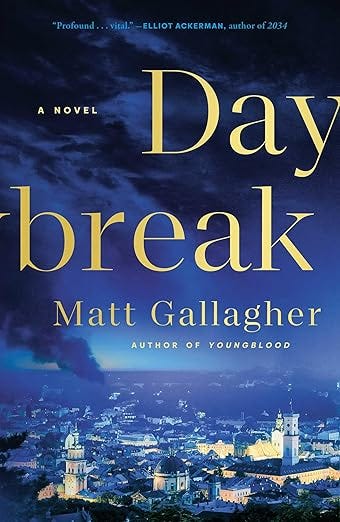What makes a book compelling? Join me in developing our “Eyes and Ears” for finding compelling stories.
In Matt Gallagher's Daybreak, there’s a story off the page that adds much to the story on the page. Daybreak takes us to Ukraine. It’s early days in the war, Mariupol is under siege from the Russians and hasn’t yet fallen. (It would fall in May 2022, three months after the invasion.)
Off the page, Gallagher, a former Iraqi War vet, did something few of us would. Compelled to act after Russia invaded, he explained to me he, “. . . joined a small group of American military vets who traveled to Lviv, Ukraine, in late February 2022 to work with a group of civilians who wanted to learn how to defend themselves in case the Russian invasion came to their neighborhoods. . . Many of these people had never fired a gun before, let alone serve in a military unit. It was basic, humbling and honest work, and they took to it with the tenacity only the threat of losing your freedom and that of your family’s can cause, perhaps.”
After returning to the US, Gallagher began work on Daybreak, a compact novel.
On the page, able to pass as normal most of the time, Luke Paxton is so psychologically damaged from his hitch in Afghanistan that when he travels with Lee, a gung-ho buddy, to join Ukraine’s fight with the Russian invaders, he can’t hide it in his interview with the Ukranian recruiter, Bogdan:
“And why are you here?” Bogdan continued . . . “By choice, you ask for the front. You seek the zero line. This is not normal behavior.”
Lee spoke first, “War made my grandparents refugees. If strangers with guns from the other side of the planet hadn’t gone to Korea? Shit. . . That’s what I told my ex-wife and kids. They need to believe I believe that. But maybe I just came here to shoot a Russian invader in the fucking face. . . .”
Then it’s Paxton’s turn to answer:
“I came here,” he began, before stopping. Any response he could think of sounded off his mind, hollow. Lee had told him the truth. I should, too, he thought. He tried again. “Well, I came here to help.”
The table turned heavy with quiet. He could tell that what he’d said was wrong by the way Lee was looking at him, or not looking at him, more toward him and behind him and around him, but not at him. He couldn’t understand, wanting to help is a good thing, he thought, it’s why their president has gone on television and asked the world for help, asked combat veterans who’d been in the suck to come and fight. Pax shifted toward Bogdan to say that, to ask who the hell was he defying his own leader’s command, only to see the Ukrainian wasn’t looking at him, either, but watching something under the table. . . . He was thumbing the prayer beads wrapped around his wrist, not like the lady at the VA had shown him, but manically, hysterically, one-two-three one way, one-two-three-four the other, rinse and repeat, like he was tapping at a video game, like he wasn’t bona fide at all but a fraud, a bundle of nerves, a betrayer of the profession of arms itself.
Can you feel the tension between Paxton and Lee, between Paxton and himself? He says one thing while his body shouts another. His nickname goes “Pax” aptly sums his current state of mind.
Bodgan accepts Lee, but rejects Pax. Pax remains far from the front. Searching for something to do, he looks up an old flame. The book is touted as part love story, but I disagree. Gallagher says it’s about lost love. He says it’s also about broken people looking for hope, looking for their own daybreak.
Pax initially interacts with fellow Americans: Lee, his former commanding officer who Pax believes is at the root of the incident in Afghanistan that traumatized him, and others. As the story progresses, he begins to interact with Ukrainians, his entrée being his old flame.
Despite its occasional shifts in point-of-view, the book is heavily inside of Pax’s head. He’s searching for what comes next in his life, what will give his life meaning.
In Pax’s case, he finds himself pulled to the one place he doesn’t want to return to, a war zone. This is the rich conflict Gallagher provides.
It’s a slow build. Impatient readers who put the book down will leave something on the table. There are many books where I feel the ending is disappointing. Daybreak is the opposite. The ending is the high point and seals the story.
As to why Gallagher was compelled to go help in Ukraine? “As an Iraq war vet, I’ve been on the wrong end of American foreign policy. I’ve been the guy standing in an Iraqi living room apologizing to an angry mother for raiding the wrong house looking for an insurgent. [Ukraine] isn’t that, it’s the exact opposite. This isn’t that, it’s the exact opposite. This is the kind of conflict that requires the moral clarity America has claimed to hold to much of our history. Do we aid those in need or do we not? That’s the matter most plain.”
Compelling words from a compelling author.
All the Best,
Geoff
If you enjoyed this post, please hit the heart “❤️” so others can find it. It’s at the bottom and at the top.




